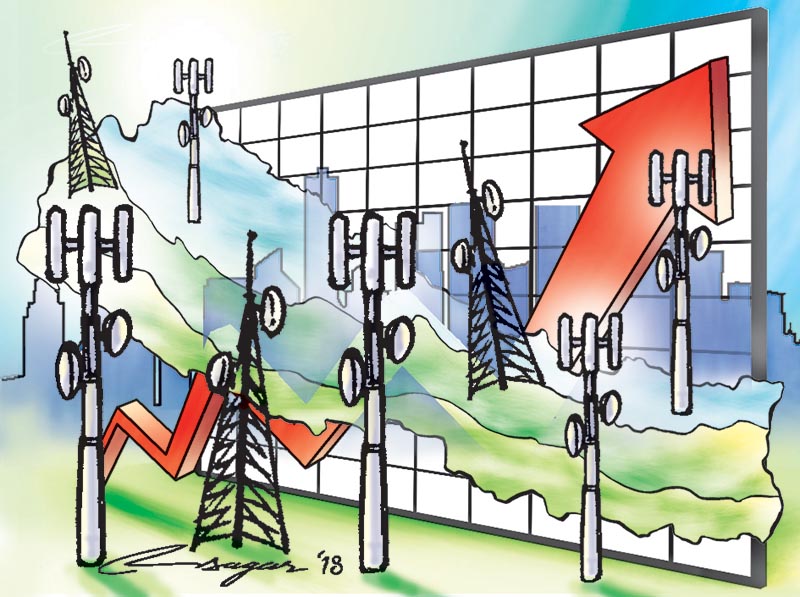Telecom in Nepal: Wider outreach required
Telecom should not be viewed merely as an efficient mode of communications. It can rather be a catalyst for sustainable and inclusive development, so there is a need to make efforts to promote this sector
The telecommunications sector has gone through a massive change in the last few decades. Innovation of modern technologies have immensely aided to development of the telecommunications sector, which evolved from the telegraph to today’s modern mobile technology. In the earlier days of telegraph, communication used to take days, while modern technology has facilitated huge amounts of data transfer in seconds.
Telecom technologies are today an integral part of development, touching all sectors of economy and every aspect of human life. Telecom is also changing the way we do business and run economies, exhibiting prospects for sustainable development.
Telecommunication is a major driver for economic growth. The developed world is immensely reaping the benefits of the available and constantly evolving new telecom technologies. The developing nations too are trying to maintain the pace.
Nepal’s telecom sector is still in its nascent stage, even though the country has made great strides in the last few decades, especially in the last one decade with the increased penetration of mobile and internet.
But when we compared to the progress in the country with that of the developed world, we are still lagging behind.
Telecom services in Nepal are mostly centred in urban pockets. A vast majority of population living in rural areas is still to get easy access to services.
The expansion of infrastructure, application of different telecom services and their cross-sectoral and multi-dimensional applications are limited to urban pockets. And in the urban areas too, the telecom sector is at a relatively initial stage compared to the global application of the new technologies.
Quality of Service and access to available new technologies is still a major gap area. Technologies that are available and extensively being used in the global market have a meagre presence in the country. The existing infrastructure is inadequate to implement new technologies in the country, without which it is difficult to implement the new technologies.
Policies and programmes for the development of telecom sector are inadequate and largely non-reflective of the potential expansion. The country’s telecom sector has not been able to grasp the diverse needs of the country (geographical diversity, remoteness, mass usage including those at the bottom of the pyramid).
Telecom is a bridging factor for all the sectors of development and in fact can be a catalyst for sustainable and inclusive development. Investment in the telecom sector is severely limited.
Nepal Telecom (NT) for years had its monopoly in telecommunication services until private players made their foray into the sector. NT was the sole service provider for decades. Ncell entered the Nepali market only a few years ago, earlier under a different brand. Out of five telecom operators with licenses to operate services in the country, the NT and Ncell currently have the major control over the sector. Other license holders (Hello Nepal, Smart and UTL) have very limited market share. Telecom should not be viewed merely as an efficient mode of communications. It is rather an important aspect of development. An inclusive approach to this sector as a pivot to country’s sustainable development is a progressive way of looking at the sector. Telecom should be viewed as a key development stakeholder.
The telecom sector can accelerate sustainable development through new technologies (mobi-doctor, tele-medicine, e-commerce, m-commerce). The rich and exhaustive data it generates can be hugely beneficial for development practitioners in their work. Its impact is immense also on other development sectors—industry, healthcare, agriculture, education and infrastructure.
Telecom has been proving itself at the global stage as the catalyst for development, and a very promising agent for creating an environment for a sustainable economy. Nepal should consider this scope of the telecom sector and gear towards integrating it in the mainstream development agenda. In order to strengthen the telecom sector, there is a need to revisit the existing legal frameworks, regulation and implementation dynamics. Region-based policies and implementation strategies to address the diverse geographical needs and institutions and implementation stakeholders are a gap area that needs to be addressed. This ensures services are accessible to the masses as per their particular needs. Regional and local level policies and programmes and their implementation will hugely benefit the diverse categories.
The policy outlook of the country should acknowledge the key role of telecom in development. In addition, there is a need to inject more money into the sector in terms of expanding infrastructure and human resource.
Enabling market regulations would encourage more business interests and investments in the sector. While it is beneficial for the country to have more operators, consumers can enjoy better and diverse services at cheaper prices.
Efforts should be initiated to bring Nepal’s telecom at the global level. We should adopt global best practices in telecom-related policies and implementation. The country should now aim to enhance the telecom services at par with those available at global level.
Bhattarai is electronics and communication engineer






